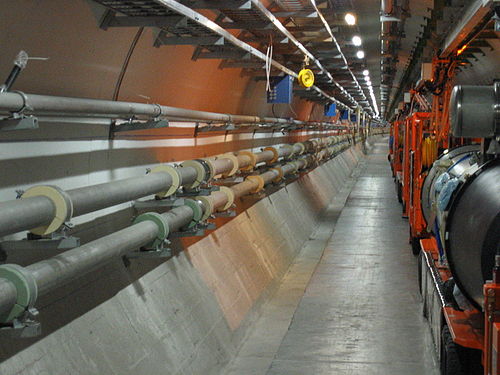September 10, 2008, marked a historic moment in the field of particle physics with the launch of the Large Hadron Collider (LHC) at the European Organization for Nuclear Research (CERN) in Switzerland. The LHC, an unprecedented particle accelerator, would pave the way for groundbreaking scientific discoveries.
The Inauguration of the LHC
CERN, located near Geneva on the border between France and Switzerland, announced this historic event through a press release highlighting its significance. At 10:28 AM, the first beam of particles injected into the LHC completed a full circuit of the 27-kilometer ring housing the world's most powerful particle accelerator.
This moment was the culmination of over twenty years of preparation and hard work by thousands of scientists and engineers from around the world. The LHC represented a significant milestone in humanity's quest to understand the fundamental laws of the universe.
Technical Challenges and Advancements
However, the LHC was not without technical challenges. Shortly after its inauguration, the accelerator had to be shut down due to an electrical issue affecting the cooling system. After repairs and improvements, the LHC was restarted on September 18, 2008.
Unfortunately, a major incident occurred during a test, leading to another shutdown of the LHC for over a year. A significant helium leak caused by an electrical connection issue resulted in the melting of two essential magnets. Addressing these technical problems required considerable efforts to ensure the accelerator's safety.
Discoveries and Records
The LHC eventually resumed operations on October 23, 2009, with the injection of protons and heavy ions. On November 7, 2009, the CMS detector detected the first particles resulting from collisions.
On November 20, 2009, the proton beam successfully completed multiple full circuits of the collider. The LHC was gradually ramped up to a maximum energy of 1.2 TeV initially. On November 30, 2009, CERN announced that it had set a new record by circulating the most energetic proton beam in the LHC, with an energy of 1.18 TeV, surpassing the previous record set by the Tevatron, an American particle accelerator.
The LHC has paved the way for significant discoveries in particle physics, including the discovery of the Higgs boson in 2012, contributing significantly to our understanding of the subatomic universe. Since its commissioning, the LHC has continued to operate successfully, conducting crucial experiments for modern science.
Sanandros, CC BY-SA 3.0, https://de.wikipedia.org/wiki/Large_Hadron_Collider#/media/Datei:CERN_LHC_Tunnel.JPG



0 comments: